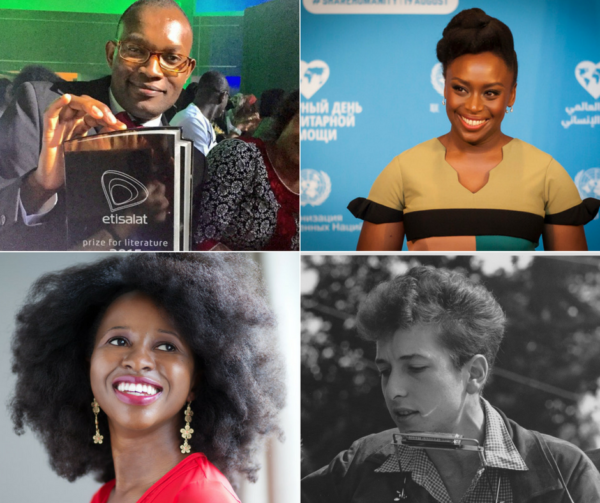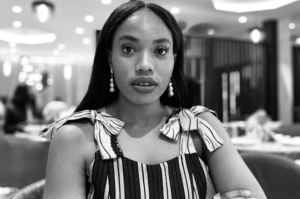In the African literary scene, 2016 was a mix of scandals and triumphs. Lots of surprises, lots of happy moments, and a handful of shocking incidents.
In the list below, we take you down memory lane to the bold, beautiful, and WTF moments in the African corner of the global literary community.
The list was compiled by Basit Jamiu (@IamBasitt) and Ainehi Edoro.
Let us know what you think of the list. We also would love to hear about your own memorable African literary moments. Feel free to share them with us in the comment section.
Enjoy!
***
In no particular order.
1. Sexual Molestation in Literary Festivals:
We all want to believe that literary festivals and events are safe spaces for intellectual communion, not places where women are exposed to sexual molestation. 2016 opened with Nigerian poet Chijioka Amu-nnadi being accused of sexual molestation by some women in his literary circles. It was an eye-opening scandal, as well as a learning moment for festival organizers who, thereafter, expressed commitment to fostering a safe space for attendees. [read here]
2. Fiston Mujila Wins the Etisalat Prize for Literature
In a global literary landscape dominated by African literature in English, Fiston Mujila’s win was a triumph. We remember the day he won like it was yesterday. African literary twitter waited with bated breath. Mujila, who hails from the Democratic Republic of Congo, was clearly favored to win by members of the literary community. But, of course, the judges had the final say. When he was announced the winner, social media erupted in celebration—one of those rare moments when the will of the judges and that of the community are in unison. [read here]
3. The Jalada Language Revolution:
Jalada blew our minds when they translated a short story written by Ngugi wa thiongo into over 30 African languages. The beauty and scale of it! No one could have imagined that such a thing was possible. But the hardworking geniuses at Jalada did. It was a beautifully pan-African moment. Everyone from Cape to Cairo came out on social media to celebrate. The Jalada collective certainly broke new grounds with that issue. [read here]
4. Apartheid Assassin at a Literary Festival
Imagine being at a literary event and sighting a former apartheid assassin. His name is Eugene de Kock who was also known as Prime Evil. He is sipping on his wine like there aren’t black South Africans in the room who suffered from an institution that he once represented in its darkest form. The Cape Town based Sci-fi writer Lauren Beukes, who was also at the dinner party, felt that something had to be done. She walked up to him and asked him to leave. He left without a fuss, and that was the end of it. [read here]
5. Welcoming Donald Trump into the amazing world of African fiction:
Adichie’s fictional account of Donald Trump’s life is an expression of pure literary brilliance. We never thought we’d live to see the day when Donald Trump would star in what is essentially an African story—a loud-mouthed politician, his Nollywood-esque trophy wife, and two conniving daughters. [read here]
6. Behold the Dreamers makes its Million-dollar debut:
After the news broke that Imbolo Mbue signed a million-dollar publishing deal with Random House for her debut manuscript, no one could sit still until the book came out. In August 2016, the most expensive African literary manuscript was published. We are still reeling from the excitement of it all. Congrats to Mbue!
7. Okorafor Hugo Awards:
We will never forget the day Nigerian SFF writer Nnedi Okorafor received what is arguably the best news ever delivered through a cellphone. She walked out of a movie theater in the company of her daughter, checked her phone, and saw that she’d won the Hugo Awards. She is the first Nigerian to win the award, so naturally we all joined in the celebration. A huge win for a writer who had won the Nebula Award earlier in the year. [read here]
8 Bob Dylan’s Nobel Prize Win:
Nothing prepared us for Bob Dylan’s win. Folks all but lost it. As you can image, it caused all kinds of intellectual fist-fighting. Petina Gappah, Chika Unigwe, Elhathan John, and Ikhide Ikheloa were resolutely #TeamDylan and called for calm and order. It was not the end of the world they cautioned. Dylan is actually great. But Molara Woods best captures the mood of the African literary community: “Na wa! Like seriously???” —> Like seriously”, “love Bob Dylan but I’m just gob smacked.” [read here]
9 Wole Soyinka and the Trolls:
Wole Soyinka is no stranger to controversies. He has been at the center of many intellectual quarrels. Notwithstanding, it is very likely that Soyinka had never encountered that strange beast called online troll until recently. Soyinka is probably used to intellectual warfare with stately rules of engagement. For example, insults have to be dished out in poetic language and nuanced counter-claims. Internet trolls exist outside the world of intellectual decorum. They know no bounds and can be bloodcurdlingly vicious. As a result, Soyinka received a lot of below-the-belt criticisms and outright insults. Soyinka may have gotten a little ruffled, but trust him to stand his ground. He fired back in a scathing piece in which he called the trolls “nattering nit-wits of internet.” [read here]
10 Adichie’s Epic 2016 Odyssey
Adichie made so much news in 2016 that we’ve decided to give you a full rundown of her escapades instead of highlighting only one. 2016 was a very Adichie year. She got the entire world talking about feminism in ways that no one thought was possible. It began with her statement about refusing to perform pregnancy. The response was mostly positive. Then she said all that stuff about Beyonce’s feminist ideology and the African branch of the Beyhive came for her. But when the global network of Chimhive refused to back down, the world somehow returned to normal. We were still processing the whole Beyonce fiasco when Adichie dropped a 9000+ word manual on how to raise a daughter feminist. The essay posted on Facebook was hands down the most inspiring Feminist declaration of 2016. The world erupted in pure joy. 2016 had been proving a weird year until Adichie’s essay dropped and we realized it was exactly what we needed. To top it all off Adichie snagged a celebrity endorsement with a global beauty brand and graced Christian Dior’s front row during Paris Fashion Week. Add to this the essays she’s written about Michelle Obama, Hillary Clinton, and, most recently, Trump. It wouldn’t be out of turn to say that 2016 has been a very Adichiean year.
11. Adam Ibrahim Wins the NLNG Prize for Literature
Abubakar Adam Ibrahim won the 2016 NLNG prize for his debut novel, Season of a Crimson Blossom — a win that made him 100,000 dollars richer. Going by the current dollar exchange in Nigeria, it was a huge pay raise. The literary community celebrated his win. Perhaps, what was most memorable about Abubakar’s win was his acceptance speech, in which he validated the power of having dreams and the audacity to pursue them. The speech, which was originally published right here on Brittle Paper, went instantly viral and is now essentially an anthem for aspiring writers. [read here]
12. Redscar McOdindo the Serial Plagiarist
A Kenyan poet who goes by the name Redscar McOdindo has a long history of plagiarizing his way to fame. He had won two prestigious awards and was enjoying quite a bit of recognition until he published a plagiarized poem on an online literary magazine (TheMissingSlate). A few weeks later, the editor of the magazine pulled down McOdindo’s poem and accused him of plagiarism. That plagiarism accusation led to a series of other investigations. It soon came out in the open that poems he published on other sites were plagiarized as well. [read here]
13. An Epic Ake Festival
Ake Festival has become the highlight of the year in African literary circles. This year, the organizing team, led by the masterful Lola Shoneyin, did not disappoint. Literary celebrities — Helon Habila, Noviolet Bulawayo, Lidudumalingani, Sarah Ladipo Manyika, and many more — attended in record number. The book chats, the Fiction Writing Workshop, the movie screenings, the live performances by Nigerian pop-cultural icons, and the joyful camaraderie made those few days in November pure magic. Don’t know how in the world they plan on topping that in 2017. [read here]
14. Afridiaspora’s Maiden Anthology
Mid-August, Afridiaspora.com made a call for submission on the theme “My Africa, My City.” In the middle of November, the anthology was released. It recorded over 20, 000 downloads within 48hrs. The collection, which offers beautiful and nuanced pieces on African cities, was pretty much a literary phenomenon in its own right. [read here]
15. Abantu Festival
2016 also saw the birth of an African book festival. Book festivals are an important part of any literary culture. For reasons, which we do not need to mention here, there aren’t enough festivals on the continent. Ake Festival is amazing but is one of a few. That is why Abantu Festival is so worth celebrating. It is essentially Ake Festival on the southern coast of the continent. It took place in December and attracted a rich assembly of writers and artists. In a South African literary landscape dominated by white literary institutions, Abantu Festival fulfills the long-overdue need for a space where black writing and aesthetic culture can be celebrated. [read here]
********
Facebook link image by Annie Spratt via Unsplash.










Hannah January 16, 2017 05:48
2016 was an exciting year, indeed! Thanks for all the reminders. This, however, just cracked me up: "Soyinka is probably used to intellectual warfare with stately rules of engagement. For example, insults have to be dished out in poetic language and nuanced counter-claims."